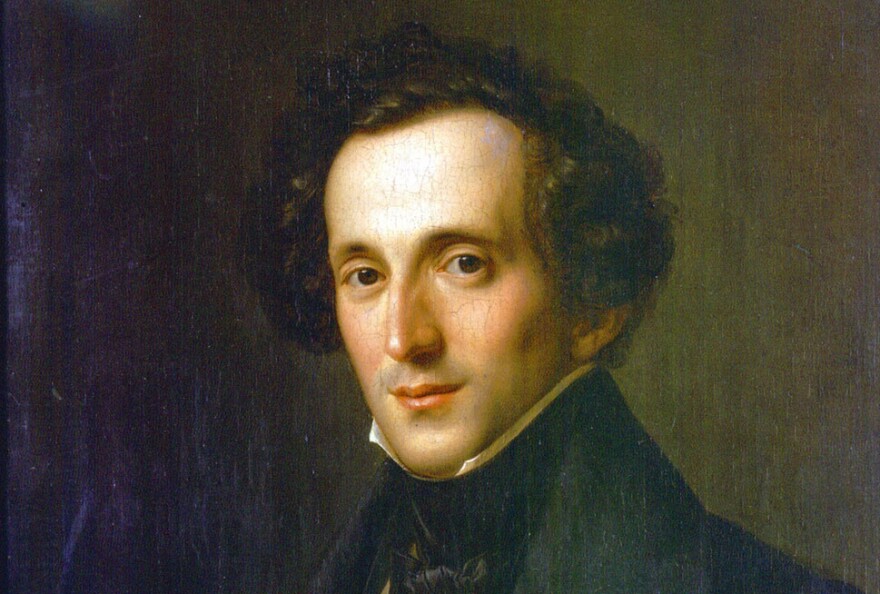On this month's broadcast, we'll share some M&M's with you...not the chocolate variety, but still quite delicious. Join us on Sunday, July 17th from 5 to 6 pm to hear works by Mozart and Mendelssohn, recorded in concert by The Chamber Orchestra of Philadelphia in 2013, 2015, and 2016.
MENDELSSOHN:
Overture to A Midsummer Night’s Dream, Op. 21
Dirk Brossé, conductor, Perelman Theater, September, 2013
The Shakespeare subjects that have attracted musicians the most irresistibly have been tragedies more than comedies. There is no end to the list of operatic, balletic, and symphonic Romeo and Juliets. Hamlet, Macbeth, and King Lear have their quota of tone poems and stage settings. too.
On the other front, that of comedy, the numbers are less striking. The Falstaff plays seem to strike the most sympathetic musical chords, eliciting notable operas from Verdi, Nicolai (The Merry Wives of Windsor) and Vaughan Williams (Sir John in Love).
Everyone, however, knows Mendelssohn’s A Midsummer Night’s Dream. Some know it in its incarnation as a Balanchine ballet. Others have heard just the overture; others again are familiar with the most famous of the incidental pieces — the thistledown Scherzo, the Nocturne that makes a horn and two bassoons sound like an entire heavenly orchestra of magic instruments, and the noisily festive Wedding March.
The overture alone, written astonishingly enough when Mendelssohn was just 17 years old, has established itself, with justice, as one of his most popular works. It stands as a perfect concert piece even shorn of the incidental music in which, 16 years later, he showed himself, he could be the boy he was at seventeen.

MENDELSSOHN:
Sinfonia No. 10 in B minor
Nir Kabaretti, conductor, Perelman Theater, March 23, 2015
The overture to A Midsummer Night’s Dream and The Octet for Strings are the works usually cited as evidence of Felix Mendelssohn’s surely unrivaled precocious genius. He was 16 when he wrote the Octet and as mentioned all of 17 when he wrote the overture. Yet, there are even earlier works, such as the First Piano Quartet, Op. 1, composed at the age of 13, that reveal a no less stunning mastery. And the 13 symphonies, or sinfonias, for string orchestra that he produced between the ages of 12 and 14.
As the series progressed, the scale of these string symphonies became steadily more ambitious, but in that regard No. 10 is something of an anomaly, for it consists of only a single movement, with a slow introduction followed by a sonata structure along traditional lines. Within this relatively familiar framework, however, is a musical structure of impressive power, reveling in the tonal richness that was to be characteristic of the composer’s mature style.
MOZART:
Symphony No. 35 in D major, K. 385 (“Haffner”)
Dirk Brossé, conductor, Perelman Theater, May 16, 2016
Mozart had taken a risky gamble when he embarked on a career as an independent composer and pianist in 1781. Despite his initial estimates of costs and fees, he hadn’t quite factored in the amount of work that was required, or that he might fall madly in love and become engaged. Thus, when his father Leopold wrote in the summer of 1782 with a commission for a serenade to celebrate the ennoblement of Sigmund Haffner, Mozart could reasonably complain that he was “up to [his] eyeballs in work.” However, Mozart ultimately acquiesced. He knew Haffner and had previously written a serenade (The Haffner Serenade,K. 250) for his sister’s wedding. Over the course of a week, the young Austrian composed a six-movement serenade in D major and immediately sent the finished movements to his father.
Seeking to re-purpose the original serenade as a symphony, Mozart cut a march and a minuet, added extra winds, and premiered the work at a prominent concert tense with family drama and romantic politics. Regardless, the concert was enthusiastically received, even by Emperor Joseph II who not only was in attendance, but reportedly stayed for the entire program. Can you imagine! Upon reviewing the score Mozart wrote, “My new ‘Haffner’ Symphony has positively amazed me… It must surely produce a good effect.”
With that, we can certainly all agree.

